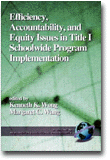
Efficiency, Accountability, and Equity
Issues in Title 1 School Wide Program Implementation
Edited by:
Margaret C. Wang, Temple University
Kenneth K. Wong, Brown University
A volume in the series: Research in Educational Productivity. Editor(s): Susan J. Paik, Claremont Graduate University.
Published 2002
How efficient is Title I, the largest federal educational program in elementary and secondary schools? What is the quality of the Title I services? Has Title I promoted equity in schools among our nation’s low-income areas? To address these important issues, this volume draws on the proceedings of two national invitational conferences, sponsored by the mid-Atlantic regional educational laboratory, the Laboratory for Student Success (LSS) at Temple University Center for Research in Human Development and Education in 1999 and 2000. These conferences aim to provide research-based information on how Title I schoolwide programs affect teaching, learning, and student outcomes and to strengthen cost-benefits in Title I program implementation to assist students in high-poverty schools. The focus of the conferences is particularly timely in view of the upcoming Title I reauthorization and the recently enacted federal Comprehensive School Reform Demonstration (CSRD) initiative.
Discussion at the conferences focused on enhancing our understanding of accountability, efficiency, and equity issues in Title I. More specifically, researchers at the two conferences: (a) highlighted findings from the National Study of Effective Title I Schoolwide Programs; (b) examined the effects of research-based comprehensive reform models in high-poverty schools; and (c) addressed cross-cutting issues such as the productivity of Title I programs, the use of technologies in the classroom, the role of the state in strengthening Title I programs, cost effectiveness of whole school reform, professional development, reading instruction, and parental involvement, which are important parts of the national educational reform agenda.
Leading researchers, policymakers, and practitioners were commissioned to develop preconference papers to serve as a springboard for discussion at the conferences. These papers included an overview of the research base and patterns of governance and conditions that lead to effective implementation of Title I schoolwide programs. The papers were reviewed by conference participants before the conferences and were used to develop next-step recommendations for advancing the implementation of the Title I schoolwide provision.
CONTENTS
Preface. List of Contributors. PART I: Efficiency. Using Market Forces to Make Title I More Effective, Marci Kanstoroom and Tyce Palmaffy. Making Economically Grounded Decisions About Comprehensive School Reform Models: Considerations of Costs, Effects, and Contexts, Jennifer King Rice. Does Title I Money Matter? Federal Compensatory Funding and Student Achievement, Francis X. Shen. Sustaining Investments in Technology: Strategies to Close the Digital Divide, Ronald E. Anderson. PART II: Accountability. The Role of the State in Strengthening Title I Programs, Margaret E. Goertz. Teacher Quality and Educational Inequality: The Case of Title I Schools, Richard M. Ingersoll. School-Family Partnerships: Policy Implications for Urban Schools, Evanthia N. Patrikakou, Roger P. Weissberg and Michelle I. Rubenstein. Toward Effective Strategies in Raising Academic Performance: Findings From a National Study of Effective Title I School Wide Programs, Margaret Wang and Kenneth Wong. Teachers’ Perceptions of Title I Program Improvement and Accountability, Jerome V. D’Agostino and Ginger L. Stoker. PART III: Equity. Title I in California: A Focus on English Language Learners, Diane August and Dianne Piche. Understanding Student Achievement Differences Between Rural and Nonrural Schools: Implications for Title I Programs and Assessments, Jaekyung Lee. Epilogue.
-
Paperback978-1-931576-10-9
Web price: $45.04 (Reg. 52.99)
-
Hardcover978-1-931576-11-6
Web price: $80.74 (Reg. 94.99)
- eBook9781607527800

-
 Addressing The Achievement Gap
Addressing The Achievement Gap
-
 Advancing Education Productivity
Policy Implications from National Databases
Advancing Education Productivity
Policy Implications from National Databases
-
 Can Unlike Students Learn Together?
Can Unlike Students Learn Together?
-
 High-Achieving Latino Students
Successful Pathways Toward College and Beyond
High-Achieving Latino Students
Successful Pathways Toward College and Beyond
-
 Optimizing Student Success in School with the Other Three Rs
Reasoning, Resilience, and Responsibility
Optimizing Student Success in School with the Other Three Rs
Reasoning, Resilience, and Responsibility
-
 Successful Reading Instruction
Successful Reading Instruction
-
 The Scientific Basis of Education Productivity
The Scientific Basis of Education Productivity

